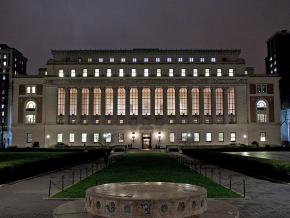Standing against racism at Columbia
A recent viral video captured Columbia University sophomore Julian von Abele haranguing Black students on campus. Among other things, shouting until his voice grew hoarse, von Abele declared: “White people are the best thing that ever happened to the world! We are so amazing. I love myself! I love white people! Fuck yeah, white people. Fuck yeah, white men. We’re white men, we did everything.”
Von Abele claims he’s not a racist, but he hasn’t repudiated the bigoted statements he made. Further, he reportedly followed the Black students into a dining hall, where he continued to hurl more racist insults — while a Public Safety officer refused to intervene, despite requests from the Black students.
In a statement, the Barnard-Columbia branch of the International Socialist Organization condemns this attack and the university’s response to it — and calls for a wider fight against racism on and off campus.
MILLIONS OF people have seen video of Columbia University sophomore and white supremacist Julian von Abele stop, assault and pursue a group of Black Columbia students with utterly abhorrent racist insults and tirades. We have also seen Columbia’s largely weak and empty statement — signed by all three deans — to “unequivocally denounce a deeply disturbing racially charged incident.”
Let us be clear: This was not an “incident.” This was a racist attack by a white supremacist. And Deans Mary Boyce, Lisa Rosen-Metsch and Paola Valenti actually failed to denounce the “deeply disturbing” racist attack in any meaningful way. They have not publicly supported, whatsoever, any of the students of color on campus or those assaulted by that white supremacist. Instead, Executive Vice President for University Life Suzanne B. Goldberg openly defended von Abele’s right to express his racist hatred.
Columbia’s statement made no mention of his stalking of Black students earlier that evening, including physically assaulting and berating yet another Black Columbia undergrad. We were told that if we “have a safety concern or want to report a potential (!) bias,” we are to call the same Columbia University Public Safety whose officers not only allowed von Abele’s racists attacks, but, according to eyewitnesses, openly defended him and his “right” to “speak his mind.” The same Public Safety that polices Black and Brown people in the neighborhood Columbia gentrifies.

Contrary to any deep commitment to a “living and learning environment free from discrimination and harassment based on race, ethnicity, religion, sex, gender, [or] other aspects of identity,” Columbia fosters the exact opposite of a learning environment free from discrimination and harassment, particularly for Black students and other non-white students.
THIS WAS no single “incident” of a mere individual. In fact, it was the second racist attack on campus in the last few weeks. Columbia allowing white supremacists to verbally and physically assault and stalk Black and Brown students is the logical conclusion of an institution that is a breeding ground for racism and bigotry. If Columbia was serious about fighting racism and all other forms of oppression, it wouldn’t normalize the very beliefs von Abele espouses by institutionalizing predominantly white, Western advances in art, literature, culture, and science to be taught, learned, and internalized as canon. It wouldn’t applaud or encourage, under the absurd guise of intellectual rigor, the many arguments similar to von Abele’s that we’ve all heard in Core Curriculum classes. Our main library wouldn’t be named after a staunch supporter of fascism, and the university itself wouldn’t be named after a genocidal colonizer.
To name just a few examples, if Columbia was actually serious about denouncing racism, it would make around-the-clock mental health resources accessible to all students and staff; it would support political organizations and the work of marginalized communities; it would give funding and care to the departments it neglects, such as African-American Studies; East Asian Languages and Cultures; Ethnicity and Race studies; Jewish Studies; Latin American and Caribbean Studies; Middle Eastern, South Asian, and African Studies (which is horrifyingly still one department); and Women’s and Gender Studies.
We, the Barnard-Columbia branch of the International Socialist Organization, condemn Julian von Abele’s racist assaults and the stomach-turning anti-Semitic attack on the office of Holocaust scholar Dr. Elizabeth Midlarsky. We also condemn the institutional mechanisms of Columbia University that help perpetuate and maintain the conditions for such attacks.
We ardently stand in solidarity with the victims of these attacks, as well as all marginalized communities on campus whose education, social environment, and very safety on campus is held in question by a university institutional culture more concerned with defending a white supremacist’s abstract “rights” than with actual, lived experiences of oppression.
We are not at all confident in the empty platitudes promising secret “investigations” by a university whose Student Conduct and Community Standards makes no mention of racism whatsoever. We stand with those calling for disciplinary measure to the fullest extent against Julian von Abele. We also know that this alone is not enough and that we will have to organize and fight to make demands real.
We in the Barnard-Columbia ISO are committed to organizing and fighting against racism and fascism wherever it appears, on and off campus, and to building the kind of student movement that can make Columbia more democratic, more transparent and more invested in the actual flourishing and learning of its students than in its corporate public-relations phrase mongering. As Dave Zirin recently wrote in the Nation, “I have never been more convinced that solidarity is the only way to win, because I don’t see another alternative, other than losing. And if we lose, we lose everything.”


